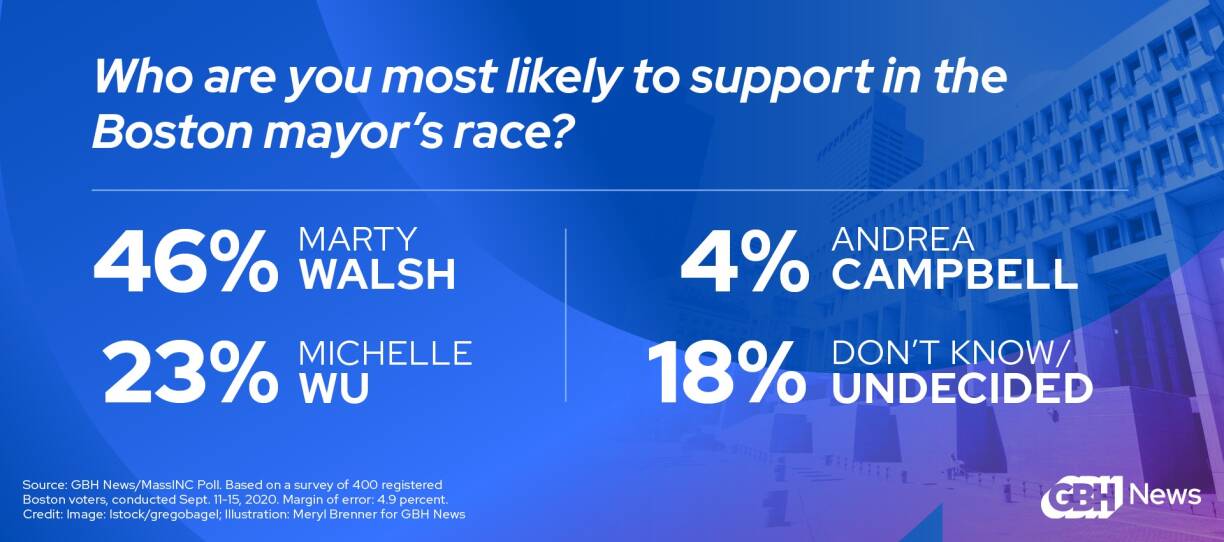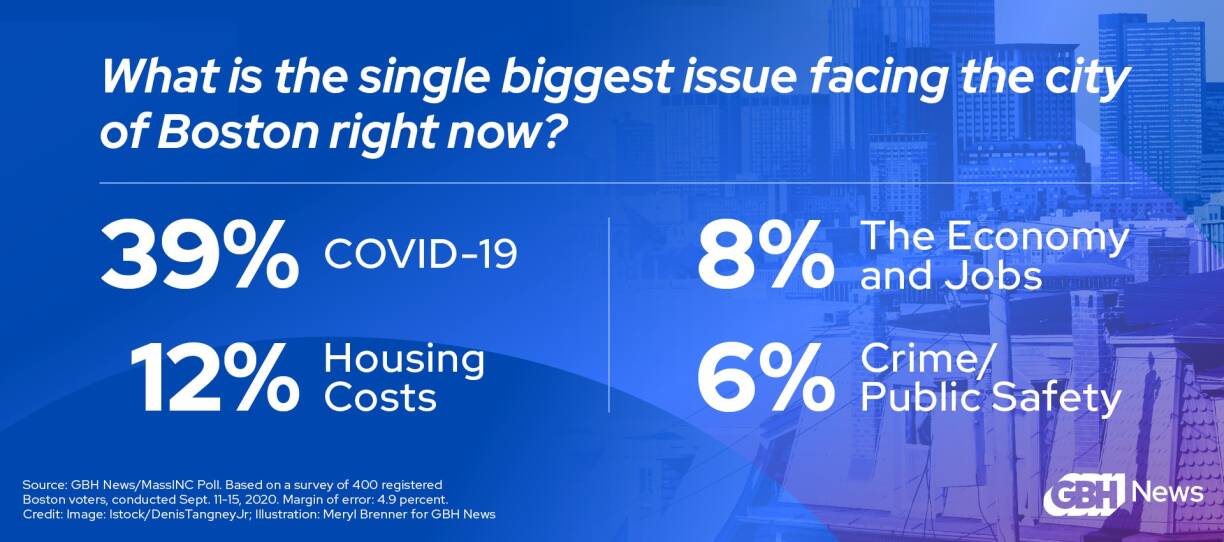A new GBH News poll conducted by the MassINC Polling Group shows that Mayor Marty Walsh would be the early favorite in a mayoral race with at-large city councilor Michelle Wu. But the poll also suggests that race would be more competitive than Walsh’s 2017 contest with Tito Jackson, which Walsh won by 31 points.
While Wu officially announced her candidacy this week, Walsh hasn’t yet said if he’ll seek a third term. Another city councilor, Andrea Campbell — who represents Dorchester, Mattapan, and parts of Roslindale and Jamaica Plain — is thought to be considering a mayoral run.
From Sept. 11 through Sept. 15 — the day Wu launched her campaign — registered Boston voters were asked who they would be most likely to support in the 2021 mayoral election if Wu, Walsh, and Campbell all run.
Forty-six percent said Walsh, 23 percent said Wu, and 4 percent said Campbell.
18 percent didn’t know or were undecided, and 6 percent said they would prefer another candidate.
Four hundred people participated in the poll, which has a margin of error of plus or minus 4.9 percent. They were also asked about their own experiences with COVID and the performance of the Boston Police Department. Their responses on those topics will be discussed in detail in a separate, forthcoming report.
Read the results of the poll here.
“It’s not surprising to me that Marty Walsh starts with a pretty considerable lead,” said Steve Koczela, the president of the MassINC Polling Group.
“Marty Walsh is the incumbent, and incumbents ... almost always win re-election, both for mayor of Boston and for pretty much any office," he added. "So certainly, Michelle Wu or any other challenger would have their work cut out for them.”
An incumbent Boston mayor seeking reelection hasn’t been defeated since 1949, when James Michael Curley lost to John Hynes after a stint in federal prison. But former city councilor Ayanna Pressley’s defeat of then-Rep. Mike Capuano in the 2018 Democratic primary showed that incumbency, while powerful, is no guarantee against a strong challenger.
Still, Walsh would start the 2021 race in an enviable position.
“I just think he’s done a pretty good job so far handling the city,” said Joe Aucoin, 44, of Allston. “Generally, unless somebody’s doing something outrageously bad, or mishandled something that’s obvious to me, I’d be inclined to stick with them.”

Walsh’s strength stems, in part, from how Bostonians feel about the COVID pandemic and his management of it. Thirty-nine percent of respondents said COVID is the single biggest issue currently facing the city, compared to just 12 percent who cited housing costs. Eight percent said the economy and jobs are the biggest issues, while six percent said crime and public safety.
When it comes to Walsh’s handling of the pandemic, 51 percent of respondents said they strongly approve, and 34 percent said they somewhat approve.
“People think he’s done well on the number one issue that’s on their minds,” Koczela said.
“I saw a headline [about] Michelle Wu attacking him about the COVID response,” said Cynthia Gura Walling, a 51-year-old Mission Hill resident.
“I have two kids in Boston public schools — one did graduate this year — so I really appreciate the awkwardness of the situation,” she added. “And I don’t have a problem with the way things were handled.”
Walsh’s support is strongest in Roxbury, Mattapan, Hyde Park and Dorchester neighborhoods generally to the west of Dorchester Avenue, where 54 percent of respondents said they’d likely support him and just 16 percent said they’d likely support Wu.
In West Roxbury, Roslindale, Jamaica Plain and Mission Hill, however, Wu has an advantage. Forty percent of respondents there said they’d likely support Wu, compared to 33 percent for Walsh.
Will Harkins, 28, is a likely Wu supporter from Roslindale who sees race relations as the most pressing challenge Boston faces.
“I want a younger candidate,” he said. “I think a female voice and a voice of color is important to have in a position of power like the mayor. And I just generally think her positions and mine mesh pretty well, in terms of social justice and the direction the city should be going.”
Gabriella Spitzer, a 29-year-old Jamaica Plain resident, is a likely Wu backer for similar reasons.
“I think it would be great to have a mayor who isn’t a white man,” she said.
Spitzer appreciates Wu’s aggressiveness on climate change, including her recent proposal for a Green New Deal for Boston. But her support of Wu came with an unsolicited caveat.
“She has promoted policies that I think might be popular, or might sound sexy," Spitzer said. "But I haven’t seen her advocate for policies that … are maybe less popular or less sexy, that are really going to require tough leadership and pushing back on the community."

Support for Walsh was especially strong among Black and African American respondents, with 56 percent saying they’d likely support him and 15 percent saying they’d likely support Wu.
Among white voters, likely support for Walsh dropped to 45 percent, compared to 25 percent for Wu. Forty-three percent of Hispanic and Latino voters were likely to support Walsh, with 20 percent likely to back Wu.
When voters were asked about attributes they’ll consider when supporting a mayoral candidate, a trio of characteristics stood out. Forty-three percent said it’s very important that a candidate is a progressive. Forty-three percent also said it’s very important that a candidate supports organized labor. And almost as many — forty percent — said it’s very important that a candidate grew up in Boston.
That’s a source of concern for Wu, who grew up in the Chicago area before attending Harvard College and Harvard Law School.
Among Black and African American respondents, Koczela notes, the belief that a mayor should have grown up in Boston is especially strong.
“Sixty percent called it very important that a mayor would have grown up in Boston,” he said. “Looking at white voters, it’s 29 percent.”
Valentine Watson, 54, of Roxbury is among the voters who feel a Boston upbringing is crucial for a mayor.
"They can understand the intricacy of the issues that we deal with," Watson said.
A politician who didn't grow up in the city can absorb Boston history, Watson added — but that's not the same as actually living it.
“It’s good when you come in and you learn,” he said “But to be here, to be a part of it? It’s just different.”
Walsh’s favorability in Boston is essentially the same as Gov. Charlie Baker’s. Sixty-nine percent said they view Walsh favorably, compared to 68 percent for Baker. But while 22 percent view Walsh unfavorably, just 19 percent view Baker that way.
Wu’s numbers, though less impressive, are still solid. Forty-eight percent view her favorably, 16 percent view her unfavorably, 17 percent were undecided, and 18 percent said they’d never heard of her.
“You’ve got two pretty popular candidates at the starting line,” Koczela said.
Campbell, in contrast, is something of an unknown quantity, with 54 percent of respondents saying they’ve never heard of her. Her favorable/unfavorable marks were 20 and 9 percent, respectively.
Voters were also asked their opinion of Suffolk County District Attorney Rachael Rollins. Thirty-two percent viewed her favorably, 15 percent viewed her unfavorably, and 37 percent said they’ve never heard of her.






